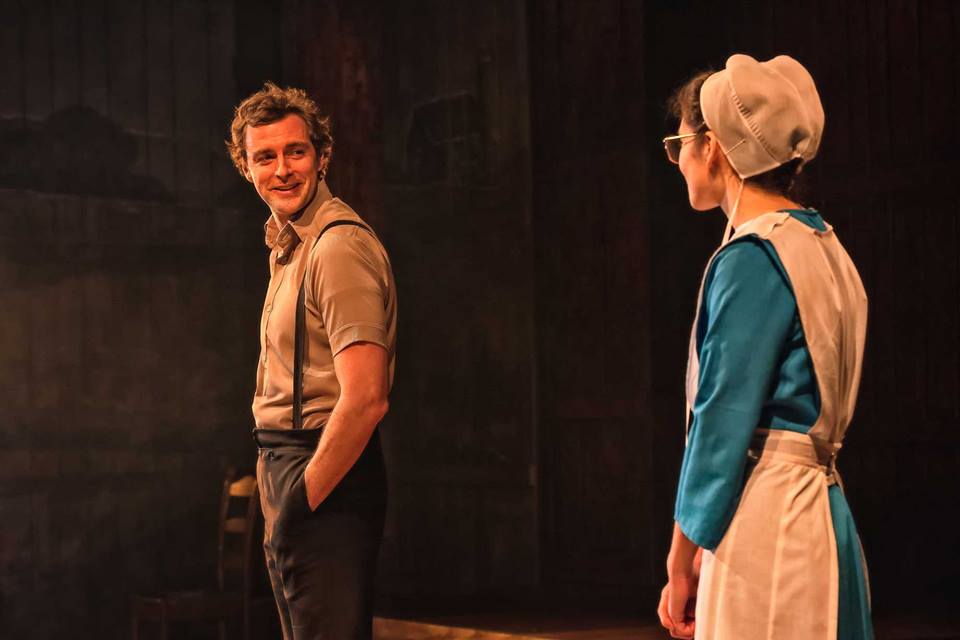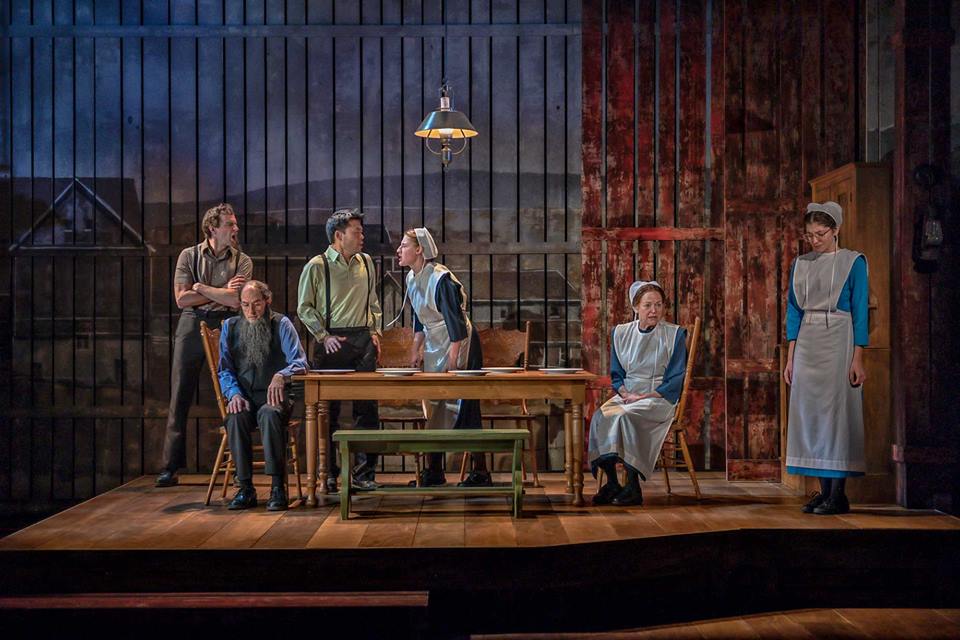by Jayne Blanchard | February 5, 2019

We quickly learn that Everything Is Wonderful is Amish shorthand for “Shut your pie hole, I beg you.”
But you wouldn’t want to miss a single plainspoken word of this magnificent, wholehearted play by Chelsea Marcantel that delves into the barbed nature of forgiveness and surrender to pain and grief and whether or not it is ever possible to truly forget.
What a hard spun joy this play is, directed with skillful introspection by Noah Himmelstein—it is tough, loving, prickly, and constant.

The story of the play concerns a present-day Amish family in Pennsylvania leaning on their religion, community and time to get over a tragedy. Esther (Deborah Hazlett) and Jacob (Bruce Randolph Nelson) just lost their two sons when their buggy was hit by a sleepy, but not legally intoxicated, driver.
Amid set designer Daniel Ettinger’s warmly appointed painted wood set, Esther and Jacob, and their young daughter Ruth (Hannah Kelly, conveying purity and cheer with freshness and without cloy), go through the motions of everyday work and chores like they always do. Yet you can see they are stunned and hurting. And not simply because of their sons. There is an empty place at the handmade wooden kitchen table for daughter Miri (Alex Spieth), who has left home and the Amish way of life.
There’s a knock at their farmhouse and an “English” (outsider) enters. It is Eric (a fierce Tony Nam, playing a gnarl of emotions), the driver of the car. Trembling, sobbing, clearly at the breaking point,” Eric can only cry “I’m sorry.”

Jacob, who seems to see everything, like his clothes, in plain black and white, is a bit taken aback. “We forgave you at the hospital,” he says, and for them, that was that.
If only forgiveness were as easy as saying the words. Anyone can see there’s a hole in their lives and their hearts as big as a field. While Eric could never fill it, he can give them something to think about other than horrific loss. By helping him, Jacob and Esther are forced to grapple with what they accept as God’s plan for them—a plan they don’t understand or necessarily agree with, and sometimes rail against, but it’s a plan they must trust according to their faith.
It’s a rocky rut to plow, and Jacob and Esther’s stoicism and quiet conviction are luminous. Everything is Wonderful goes back and forth in time between the trying present and the circumstances that lead to Miri’s separation from her family.
Between the struggle, there are lighthearted moments, especially in the sisterly affection between the sweet Ruth, who actually finds joy in domesticity, and the more headstrong and restless Miri. Ruth, beating her scrub brush in time with a hymn, can make floor cleaning fun, but you can also see it may not be enough for Miri.
Eric trying to live the Amish idyll is endearingly funny, as an entitled Millennial has his first experience with manual labor, not even low tech but no tech and social media that largely entails keeping your mouth shut.
Other flashbacks reveal Miri’s being amiably courted by Amish boy wonder Abram (Steve Polites, playing the role with hearty brio that you admire but don’t fully trust), a strong and strapping young man who believes in the community’s tenets of hard work and hard rules. The two are about to have their “Rumspringa,” a time between 18 and 20 when the young people can whoop it up and gain freedom from their families. Miri’s plans include getting a library card and reading “forbidden” books; Abram wants to try cocaine and drive a monster truck.
Abram’s insecurities about holding onto Miri lead to decisions that nearly destroy her. As in the “English” world, women are judged more harshly and bear the crushing weight of what men have done.

The outside world is a threat and a cause for pain for this Amish community, but there is plenty of unspoken strife inside. As Esther, Hazlett is a marvel of stillness and disquiet, as expressed in one indelible scene she silently pelts the barn with eggs, her face hard. Hazlett conveys the roiling complexities of the seemingly placid Esther—on the outside, a woman scolding and fuss-budgety with her family and an iron-clad devotee of community rules and mores, but in the inside holding tightly onto the same scalding anger that consumed her mother.
Anger seems a family trait and Spieth’s Miri sputters with it, righteously railing against her parents and the rigid way of life she left behind. Yet her Miri is also touchingly vulnerable, eager to live a good, full life but conscious of what’s keeping her down.
Nelson contributes a masterfully pared down and thoughtfully terse performance as Jacob, a man of few words and every one deliberately chosen. He and Hazlett make use of the full silences in the play, revealing the telling details of their marriage without saying a word.
Every time I described the plot of Everything Is Wonderful to friends, they either said with a grimace that it sounded like a tearjerker or sentimental. Not a sob story at all (although the final scene may have you heading out to the streets of Baltimore with tears sliding down your cheeks; no worries, we’re used to it.) but a clear-eyed and sobering look at forgiveness, love, and faith.
Everything Is Wonderful by Chelsea Marcantel . Director: Noah Himmelstein. Featuring: Deborah Hazlett, Hannah Kelly, Bruce Randolph Nelson, Tony Nam, Steve Polites, Alex Spieth. Set Design: Daniel Ettinger. Lighting Design: Cory Pattak. Costume Design: Ben Argenta Kress. Sound Design and Original Music Composition: Pornchanok Kanchanabanca. Dialect: Steve Satta. Fight/Intimacy Choreography: Lewis Shaw. Dramaturgy: Robyn Quick. Stage Manager: Cat Wallis. Produced by Everyman Theatre . Reviewed by Jayne Blanchard.
click here to read the original review






